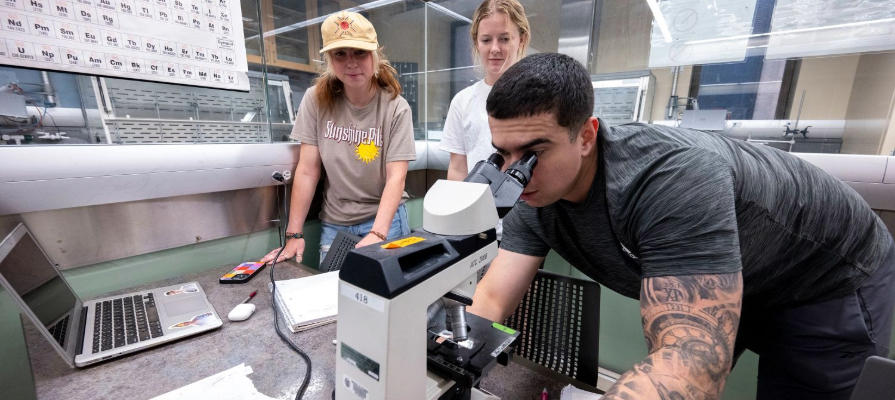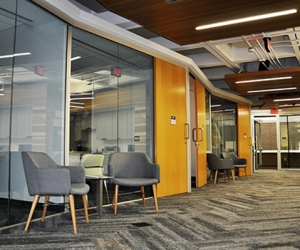
Fueling Economic Mobility in Pittsburgh’s Life Sciences Sector
Supported by the Richard King Mellon Foundation, this job-creating project will develop new educational credentials and partnerships to transform Pittsburgh into a life sciences powerhouse.
The School of Education will lead a new University of Pittsburgh effort to expand the region’s life sciences workforce by developing new community-oriented job training programs for local workers.
New skills, credentials, and career pathways are needed to prepare the thousands of workers who will soon join this emerging industry in Western Pennsylvania.
“The Pittsburgh region has a critical window of opportunity to become a life sciences powerhouse, but we must act swiftly,” said Eboni Zamani-Gallaher, Renée and Richard Goldman Dean of the School of Education, and principal investigator of the project. “Our project aims to create clear career pathways to build a strong, diverse workforce for this growing industry, which is expected to add 24,000 life sciences jobs and 180,000 related jobs in southwestern Pennsylvania over the next five years.”
The life sciences industry produces biological medicines, or biologics, as targeted treatments for a wide range of diseases, including cancer, auto-immune disorders, and infectious diseases. Vaccines, gene therapies, and blood products are forms of biologics. The market is expected to grow significantly due to increased demand for personalized medicine and declining production costs.
Titled the Life Sciences Career Pathways Initiative, the project is funded by a nearly $498,000 grant from the Richard King Mellon Foundation. The effort will bring together several Pitt entities, local K-12 schools, nonprofit organizations, and industry partners to conceptualize and create new career pathways in the life sciences.
While some positions in the life sciences workforce will require PhD-level expertise, new advances in computing, robotics, and AI are expected to create opportunities for workers seeking employment with livable wages. Many jobs will not require a four-year degree, which is often a barrier for individuals from under-served communities.
The School of Education’s workforce pathways project will focus on non-degree, non-credit programs to connect students with for-credit courses, hybrid and online experiences, certificates, and stackable credentials. These certificates and credentials will be aligned with the skills needed by industry.
“By prioritizing the inclusion of job seekers typically excluded from STEM roles, we can ensure they benefit from this growth and contribute to the economic development of the region,” said Zamani-Gallaher.
Prioritizing Local Communities

The School of Education, along with Pitt’s Office of Engagement and Community Affairs (ECA) and the University of Pittsburgh Center for Excellence in Digital Education (EDGE), will join with Pittsburgh Public Schools Career and Technical Education, Community College of Allegheny County, and Pittsburgh Life Sciences Alliance on the project.
Other core partners are Pitt BioForge at Hazelwood Green and anchor tenant ElevateBio, which has committed to creating 170 jobs at the site.
The project will first target potential workers from Greater Hazelwood, Homewood, and the Hill District. For the past two years, Pitt’s ECA and BioForge have been working to learn what residents need and want for life science education and employment.
“The program continues to strengthen Pitt’s approach to translating the life sciences sector development to economic opportunity at the community scale,” said Lina Dostilio, Pitt vice chancellor for external relations.
Based on extensive industry and community input, the project will develop life-sciences career pathways in southwestern Pennsylvania. Those programs will include early exposure for middle and high school students, a credential-to-degree pathway in the life sciences in two- and four-year higher education institutions, and an immersive experience at Pitt’s BioForge that will place associate-degree holders within project teams.
Pitt EDGE will partner with industry representatives in the planning stages to assure that workforce training programs align with emerging trends.
Developing Growth Industries

In addition to the career pathways initiative, the University of Pittsburgh has received a $308,000 grant from the Richard King Mellon Foundation to advance cybersecurity education in the region.
That project will create The Greater Pittsburgh Cyber Hub, a regional cybersecurity talent pipeline to enhance job placement and retention.
This grant, along with the School of Education project to develop career pathways in life sciences, was awarded following a call for proposals for projects to create or enhance partnerships with employers that train workers in key industries.
“Working with so many partners, we together have made great progress in enabling these emerging industries to take root in Pittsburgh,” said Richard King Mellon Foundation Director Sam Reiman. “But those industries only will flourish if we together are just as serious about creating the sector-based partnerships that will produce the trained workforce these emerging industries need.”
At its core, the School of Education program is focused on creating career pathways for Pittsburgh residents that historically have been excluded from technological advancements. The design of the educational offerings will be based on their input.
The project will help local communities thrive, while bolstering the region’s life sciences industry.
“Our goal is to ensure that these job seekers are the first to become an integral, thriving part of this emerging life sciences industry,” said Zamani-Gallaher.




